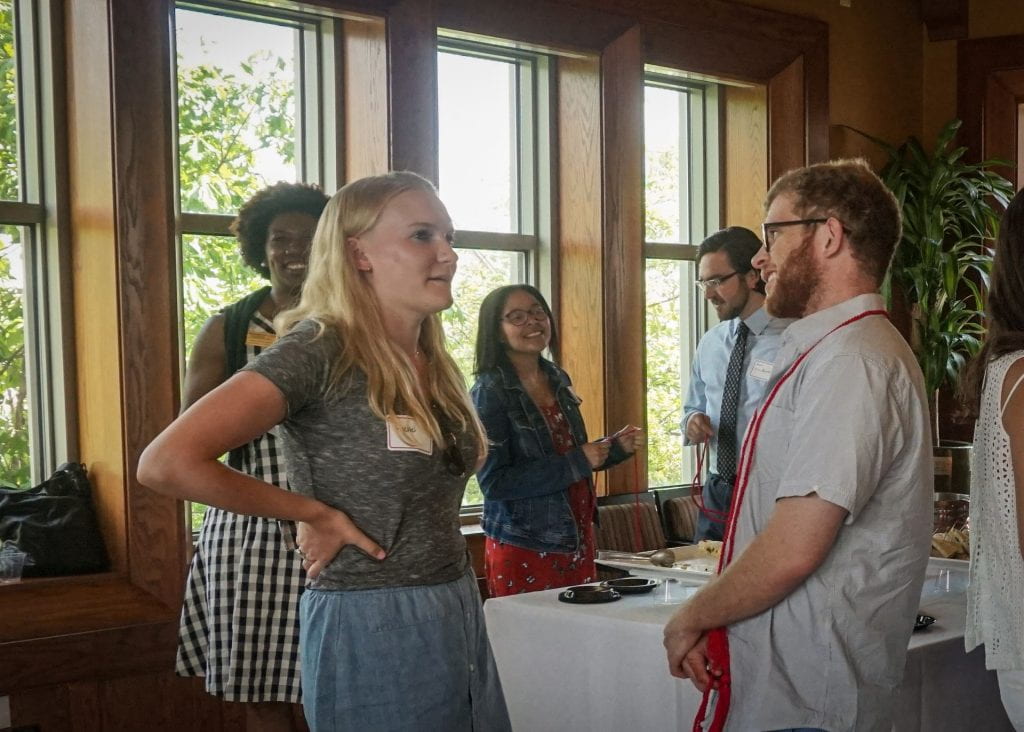
Civically minded work does not end when students conclude their time with the Gephardt Institute, which holds true for alumna Rachel Harris ‘18. During her time at WashU, Harris double majored in Educational Studies and Spanish while working at the Institute, which led her to the work she does today.
For the last four years, Harris worked with the Donald McKay School in East Boston. She is now pursuing a Master of Social Work full time, which consists of three days a week dedicated to an internship and two days a week of classes at Boston College. Her lifelong connections to Massachusetts and education guided Harris through her civic journey.
“I always knew I wanted to do something that was people-facing, and especially child-facing,” Harris said.
Growing up, Harris imagined herself as a pediatrician, but, through the Gephardt Institute and a high school education seminar, she pivoted to educational policy. Harris wanted to promote educational policy from an informed position, so she became a teacher. After returning to her home state of Massachusetts, Harris was placed in the Boston Public School system, while getting a master’s in education from University of Massachusetts Boston. The urban education space helped Harris learn more about students’ social emotional learning in the classroom.
Harris dedicated the last four years to understanding how any student can be successful in the classroom. Her passion for her students at the individual level led to her interest in becoming a school social worker.
“I sought out an environment where there would be like-minded, young teachers who want to put in that extra work and go those extra miles,” she said.
At Donald McKay School, Harris was a founding member of the Family Support Team. The team’s mission is to identify and meet the needs of low-income families in their school community which, amid the COVID pandemic, often meant food support. The program was able to raise more than $30,000 for the cause.
While at the Gephardt Institute, Harris was also a part of enacting change in the education system. As a part of the Hawthorn InvestiGirls Program, a partnership with the Hawthorn Leadership School for Girls, Harris worked with student groups from WashU to lead a workshop or an activity together with young women. Harris remembers this program as one of her favorite efforts for collective learning. She remembers specifically an improv group from WashU that put on an improv class with the Hawthorn girls, and Harris got to see how the opportunity liberated their view of themselves and of possibilities of what school can look and feel like.
Another highlight of her time at Gephardt is when MTV gave Harris a spotlight to shine light on civic issues. The experience made her realize pop culture and society was catching up with the importance of giving back to the community.
“I was like, okay, we are on the right track,” Harris said. “People are starting to notice the work that’s happening, and that’s a great feeling to know it might be more of a forefront issue going forward as I was leaving college.”
Since her involvement with these efforts at Gephardt, Harris has stayed connected to the mission of civic and community engagement through simply calling state and local representatives to share her opinion.
“I remember the first time I did it. My state representative called me back and was like, ‘Let’s have a conversation about it.’ At the end of the conversation, he asked ‘Do I have your vote?’”
As important as it is to stay on top of one’s civic duties in terms of advocation with local representatives, Harris found empowerment in the ability to prioritize social work independently. Harris explained that ideally one’s career would naturally incorporate social impact work rather than satisfying it as an afterthought. Harris encourages WashU students to find a career that prioritizes social consciousness.
However, there is a way to balance working for others as well as working for yourself by avoiding burnout and promoting longevity.
“I spend my afterwork time taking care of myself to make sure I can stay in this space for as long as I can,” Harris said.